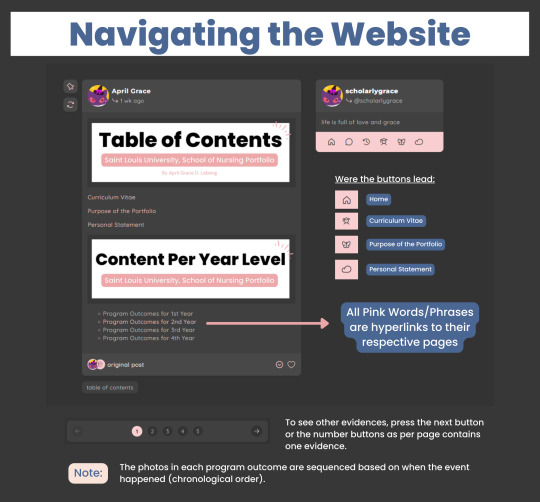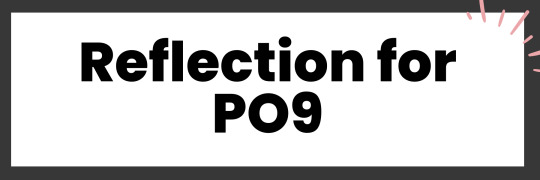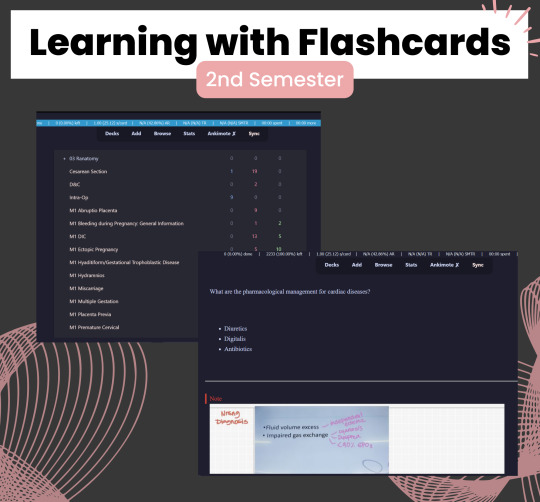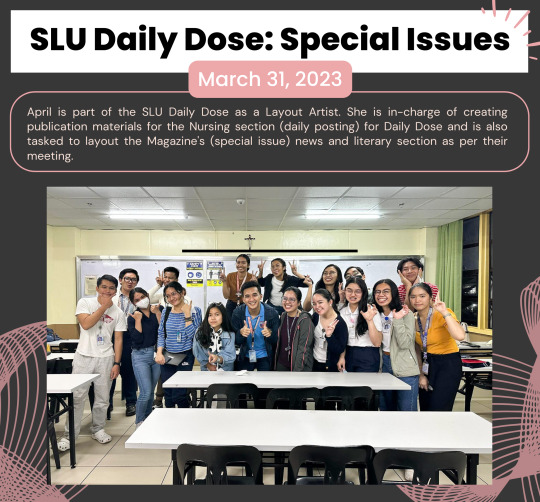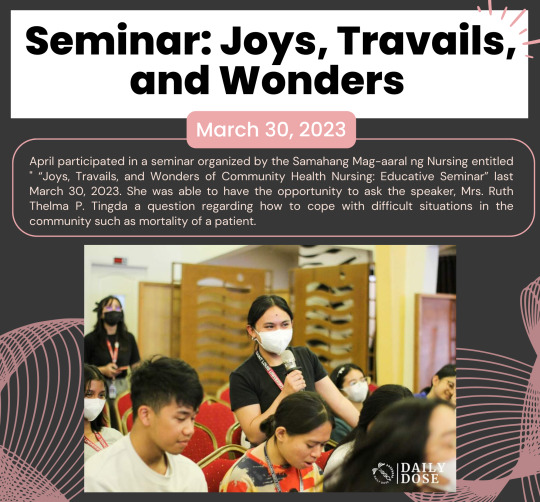Text
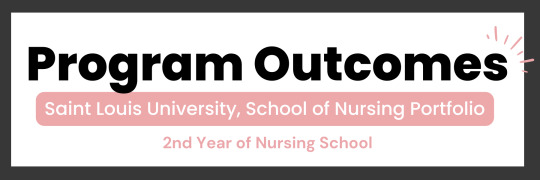
Integrate knowledge of physical, social, natural and health sciences and humanities in the practice of nursing
Apply guidelines and principles of evidence-based practice in the delivery of care
Perform safe, appropriate, humanistic, and holistic care to individuals, families, population groups, and community utilizing nursing process
Communicate effectively in speaking, writing, and presenting using culturally-appropriate language
Report and document client care accurately and comprehensively
Practice beginning management and leadership skills in the delivery of client care
Participate in the generation of new knowledge and development projects
Utilize techno-intelligent care systems and processes in health care delivery
Develop entrepreneurial skills in the delivery of health care
Practice nursing in accordance with existing laws, legal, ethical, and moral principles
Work effectively in collaboration with inter-, intra-, and multi-disciplinary and multi-cultural teams
Engage in lifelong learning with a passion to keep current with national and global developments,as well as, nursing and health developments
Demonstrate responsible citizenship and pride in being a Filipino Louisan nurse
Adopt the nursing core values in the practice of the profession
Practice Christian values in their personal and professional endeavors as a Louisian in the service of the CICM
0 notes
Text
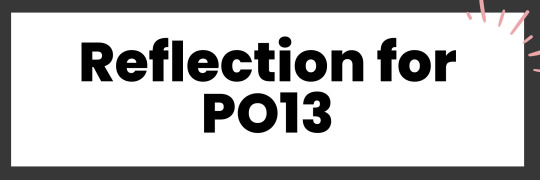
It is a fact that the more time a patient is not able to get CPR during arrest, the lower the chances of survival. What happens then if there are no doctors or emergency services in the area?
We have an inherent trait of being 'malasakit' to our fellow Filipinos. But how can we manifest this nationalistic trait? It is through helping our brothers and sisters whenever they are in need.
CPR is one skill that shows 'malasakit'. When an emergency requires CPR, we nurses must volunteer to perform it regardless if the one in need is our relative, our sibling, or a complete stranger. This is the answer for the question above. It is our duty, my duty, to see that my community members are safe and are able to get the timely intervention.
The moment I was practicing CPR, it made me proud because this skill that I am developing can potentially save countless of people as cardiac arrests can happen anytime, anywhere. It was very tiring at first because I am slightly unfit, but I am trying to be more active in my lifestyle so that I can efficiently perform CPR when the time arises. I also had trouble with counting during practice because I would lose my counting. However, our CI told us a technique of counting until 20, 5 times. This helped me keep my counting on tract. In the future, I would want to volunteer in organizations that help in rescuing and performing emergency health services (such as CPR) so that I can further improve this skill.
0 notes
Text
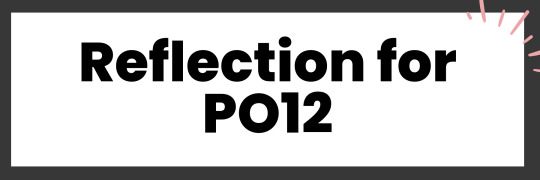
I decided to add photos of the seminars I joined, and a photo of my works for Daily Dose.
The reason why I added of photo of my works from Daily Dose to this program outcome is that I realized that I am not aware of the rich history of nursing nor the national and international events that is currently happening. If I weren't in charge of layouting the graphics for this type of information, I would not be made aware of it. It makes me happy that while I am doing something I am passionate about (graphic design), I am also learning new things.
During the school year, I attended two seminars. One titled 'Nurses during Disasters' was held online by post-grad students from SLU.
I've learned so much about different roles we can assume when tragedy strikes. It made me happy to know that our skills aren't just limited to the hospital, but outside as well. We are integral parts in the system of keeping our community safe. We were taught about command systems, disaster management, and mental health during disasters. It was a holistic seminar that I've enjoyed.
The most recent seminar I attended was about community nursing, titled 'Joys, Travails, and Wonders of Community Health'. It was insightful and inspiring at the same time. I listened eagerly to the speaker's story and took notes on my tablet. I learned that while it may not be very glamorous in many nurses' eyes, it is undoubtedly fulfilling to help the community and to create connections that will last for years and decades. The speaker told us a story about an individual in the community that recognized her and her team as the ones who helped her mother give birth to her. She also recalled when one of their patients died and how devastating it was for them. However, through prayer, they were able to move forward.
I was only able to attend two seminars because of my schedule. I also wasn't able to manage my time well. So instead of joining a seminar that I wanted, I was cramming my requirements.
I plan to be more active in attending seminars because it is a trove of knowledge. I also plan on actively participating in question-and-answer portions as well. Based on experience, asking the speakers questions allow me to really ask things I'm curious about. It can be nerve-wracking at first, but when I get an answer, I am satisfied and educated. I will also improve my time management skills so I can attend more seminars in the future.
0 notes
Text
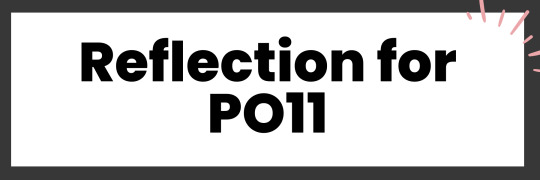
The evidence I decided to demonstrate this program outcome are: photos of my D&C case, my organization (Daily Dose), and my collaboration with the medical student during post-op monitoring.
The hospital is composed of many teams of different professions. During the D&C surgery, there was an Ob-gyne and her medical students, an anesthesiologist, nurses, nurse aids, and student nurses alongside their CI. So you can imagine a small room packed with so many people. In order for the minor case to proceed well, we must all work together effectively and efficiently. While I handed out the instruments to the Ob-gyne, the medical students informed her of the patient's information. My clinical instructor was then in charge of setting up the instruments and giving instruments that weren't on the sterile table. My CI also guided me as the procedure went on. And as we did our roles, so did the other team members. Without collaboration, we might be unable to do the procedure correctly and safely.
There would be times where I would feel "natataranta" because I feel pressured. Additionally, I sometimes forget the names of the instruments.
During post-op, I also experienced monitoring the vital signs of the patient alongside the medical student. We were friendly with each other and they even gave me advice on how to improve as a student nurse both in the wards and in the OR. If I didn't communicate with them first, we might not be able to have that conversation. Communicating with them also allowed the both of us to be on the same page regarding the patient's status.
My plan for improvement is to memorize the instruments and be better at anticipating the doctor's needs. I also want to improve my communication skills with other healthcare members in the hospital by being more open-minded and polite.
Lastly, as for my organization, I work with students from different courses of SONAHBS to create content for Daily Dose. I have to be on excellent terms with everyone for things to go smoothly. Communication is also necessary because we mostly talk through messenger due to our conflicting schedules. If we couldn't communicate properly, we might be unable to create or post content on our Facebook page.
Overall, communication whether it be in my organization or in the hospital, is vital to keeping things going. It prevents errors in the field and creates a better atmosphere for everyone.
0 notes
Text
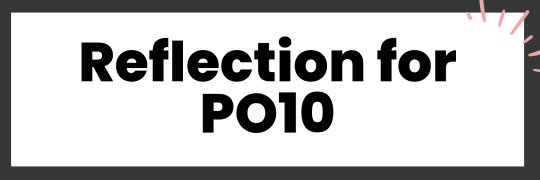
For this program outcome, I included photos such as my pre-operative FDAR, correct medication calculation, and post-op of my D&C.
In nursing, it is essential to follow laws and principles because we care for someone's health and body. One error can cause a ripple of problems ranging from discomfort and pain to possible death. We have a heavy set of responsibilities on our shoulders.
Before every surgery, we are required to do the pre-operative checklist.
Jewelry, contact lenses, and dentures should be removed by the time the surgery starts; we are responsible for ensuring it happens. If dentures aren't removed, they will be removed during surgery, and it might get thrown away afterward. It can frustrate the patient because dentures aren't cheap and can range from 5,000 pesos to 20,000 pesos depending on the type. Jewelry can cause burns on the patient's skin during surgery, especially when an electric current is used. It also harbors pathogens that will compromise the sterile field. Additionally, an NPO patient before surgery should be asked when their last meal was because they might aspirate on stomach contents during surgery if they secretly ate during their NPO time. If they ate despite being NPO, we could immediately inform the team for surgery to be delayed.
All these can be avoided by going through the procedure of doing the pre-operative checklist and FDAR. Not only does it help with the patient's safety, but it also ensures that we prevent any legal complications for the team.
In addition to mandated checklists, we must follow nursing principles such as autonomy, beneficence, justice, and non-maleficence.
What I've done to prevent harming my patient (non-maleficence) was 1) doing the pre-operative checklist, 2) keeping myself and my field sterile, and 3) knowing all my responsibilities outside and inside the OR. I also did not take any unnecessary actions that could compromise the surgery. Additionally, we respected the client's autonomy by listening to her wishes to maintain a happy attitude and not making too much noise when going to her room. In addition to the nursing principles, I also followed the principles of privacy and confidentiality by not disclosing any personal info of my patient to anyone who is not involved in her care, nor did I try to pry into her personal life.
Lastly, when preparing medications, I did my best to follow the patient's rights, such as correct dosage, correct time, correct medication, educating the patient on the drug, and many more. During my first rotations, I would still make mistakes, especially regarding the proper dosage. But with the help of my CIs, I've improved throughout the semester.
I plan to improve myself further by practicing my calculations, memorizing my formulas, always being aware of my responsibility, especially in the OR, and always making sure to do any checklist to prevent complications.
References
Trevisani , J. P. (n.d.). Jewelry is not safe practice during surgery. Jon Paul Trevisani, MD. Retrieved April 10, 2023, from https://www.jptrev.com/frequently-asked-questions/reasons-why-jewelry-is-not-safe-during-surger/
0 notes
Text
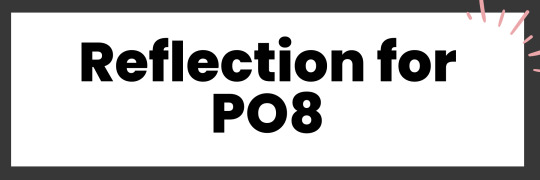
Since we mainly rotated at SLU-SHMC, I've become accustomed to their MEDSYS application. At first, navigation wasn't apparent with the plethora of buttons and drop-down menus. However, my group members were kindly willing to help me so I could grow familiar with the site's layout and actions. The MEDSYS has helped lessen the workload of all healthcare personnel in the hospital because we don't have to write everything by hand. It is efficient and effective.
During my last few rotations this semester, I no longer needed to ask my classmates where a particular button was located. Additionally, I am more knowledgeable about the application's features than when I first started using it. Creating the FDAR was more manageable than before since I didn't have to write everything. In the next time we rotate at SLU-SHMC, I hope I will be more efficient in using the MEDSYS.
0 notes
Text
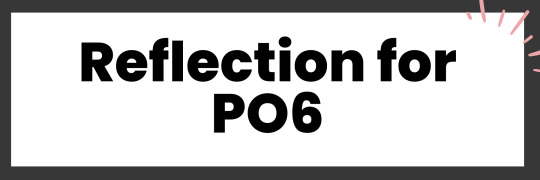
During some of my shifts, I was assigned as either the head or assistant head nurse for the day. The very first time I was assigned was when we were in the OB ward. It was nerve-wracking as I had no idea what the responsibilities were. One of my CIs also mentioned that I was an inefficient leader, which I agree with at that time.
Monitoring the IV levels for each member of the group was also quite stressful because my skills regarding calculating and anticipating IV levels at that time still needed to be developed. However, the more rotations we did, the more my leadership skills improved. However, I am unsatisfied with the improvement as I am still not confident with the skills needed to be a head nurse. Although I understand that we are still students and we are not expected to know everything, it still makes me stressed sometimes.
There are times where I am also delayed in taking the closing vital signs from my group members because they weren't able to do it yet. Sometimes, no matter how much I ask them to take it so I can give the data to the nurses, they don't even listen. It makes me feel invalidated at times.
I plan to improve by practicing the skills required to be a head nurse such as: IV skills, delegating tasks, thinking on one's feet, and providing assistance to my group members.
0 notes
Text
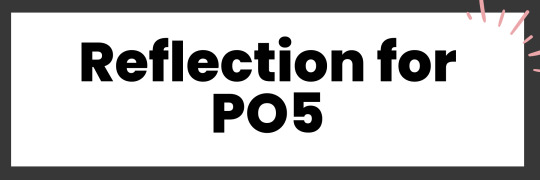
As evidence for this program outcome, I chose my FDARs and my NCP (fatigue) as it clearly shows reporting and documentation of client care.
In creating my FDAR, I know it needs to be accurate and comprehensive. It details our care to patients during our shift, their feelings, signs and symptoms, and my evaluation. It is imperative to develop the skill of writing an FDAR as this document has ethico-legal implications - it is our sword in legal cases. Aside from that, it shows our dedication to our patients. As mentioned in previous POs, I still have trouble writing my FDAR because I am not confident in my skills.
I often contemplate too long on what type of nursing diagnosis is appropriate. There is also times where I have insufficient data for my FDAR, which can make writing my FDAR frustrating. I want to improve my data-gathering skills to create an accurate and comprehensive patient report. I also want to improve how I write my FDAR per the standards of the hospital we are rotating in.
The nursing care plan is a document showcasing data gathered using the nursing process. The NCP also shows appropriate interventions, client goals, and criteria for evaluation. Like the FDAR, it has to be accurate and comprehensive as it focuses on details regarding the client's condition and the appropriate interventions. It is exemplified by having a rationale portion. Compared to making an FDAR, creating an NCP is less cognitively demanding if you're familiar with the problem and as long as no pathophysiology is involved.
The area that I need help with is the explanation of the problem since looking for scientific and complete information about the problem can be challenging at times since there are so many resources out there. I plan to improve by asking for feedback from my clinical instructors and using my old NCPs as a guide.
0 notes
Text
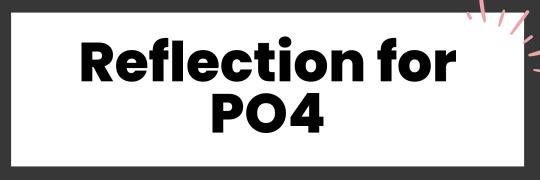
Communication integrates several skills, such as verbal and non-verbal communication and active listening. Not only should communication be effective and efficient between multi-disciplinary healthcare workers, but between healthcare workers and their patients as well. If there is miscommunication between any of the parties in the hospital, it can lead to medical errors, and inability to provide holistic and appropriate care. It can also lead to gathering incorrect or inaccurate data from the patient if they were unable to understand what you were saying.
I have chosen evidences such as my FDAR and my health teaching brochure.
FDAR is the documentation of the patient's well-being and status, interventions done, and their subsequent response to these interventions. It requires the nurse to be comprehensive yet precise in their written report, in a language that is culturally-appropriate so that all nurses are able to understand it well. In this case, we are using English alongside other dialects. If my FDAR is not well-written, I might confuse the nurse after my shift. It can also lead to miscommunication and possibly errors.
Making my FDAR is difficult sometimes as I am unsure what type of nursing diagnosis is the most appropriate, or how to format my report. But as time passed, I improved a bit compared to when I first made an FDAR. Honestly until now, I still struggle with making it. There would be times that it takes me more than 30 minutes to just find the appropriate nursing diagnosis for the patient. I hope that in the future, I can be more efficient in my documentation through trial and error and constantly listening to my CI's suggestions.
In health teaching, not only does it require our material to be well-written based on the client's preferred language, we should also be well-spoken and understandable when conducting the teaching. During my teaching, I would always do my best to talk in a language or dialect I knew and that they feel comfortable with.
It can be hard sometimes as I'm not fluent in any language. However, I'm doing my best to practice my Tagalog and Ilocano with my classmates since most of our patients speak them. It makes me happy whenever my client eases up to me because I talk a language that they're comfortable with, most often Ilocano. I plan on continuing to develop my Tagalog and Ilocano vocabulary.
I still have a long way to go when it comes to my communication skills. There would be times where I use words that aren't contextually-appropriate during a conversation. I also mix up my language a lot (taglish, ilocano-english). However, I am still proud of whatever improvement I've gained through my duties in the hospital and community.
0 notes
Text
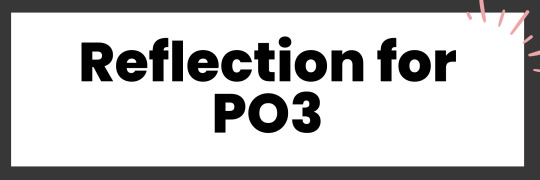
Compared to other healthcare professions, Nursing emphasizes holistic care by integrating different areas of our lives into one as they all influence one another. I choose photos from my community duty and my FNCP because it showcases the humanistic and holistic care of individuals and families, especially in the community.
When doing my profiling and interview for the FNCP, I didn't only focus on their medical history or condition. We also discussed their socioeconomic status, environment, and overall mental well-being. After assessing their needs, I created an initial plan encompassing different areas of their lives and discussed it with the family to identify their priorities, wants, and needs. Through their feedback, I've revised the care plan, which I passed as my requirement.
The family that I was fortunate to work with is a Muslim family that works at the night market. This means that they are busy in the afternoon fixing goods that they will sell at night. To avoid inconveniencing them further, I tried to limit how much time I could interview the family. Although I limited how long I could interview the family, I still exceeded it by ~15 minutes. I realize that I need to be more organized in my way of asking questions and be concise with my explanations.
I did well in engaging with the children during the health teaching event. I observed that one of the children was shy and hesitant to join. I thought to myself, how can I help this child participate? What I did was to ease her up, then encouraged her to join by doing the hand-washing movements as well. After the event, I re-evaluated the child's demeanor and saw she was slightly more receptive to us student nurses.
As much as I want to praise myself for my accomplishments in this PO, I still have a long way to improve my methods of providing safe, appropriate, humanistic, and holistic care. One would be enhancing my communication skills, as it helps gauge the information I need to give them the required interventions and to know what to evaluate. It is an essential skill as it dictates the flow of the nursing process. Mistakes in any of the nursing process can mislead a nurse, creating an unsafe environment. There are also many times in my hospital duty that I forget to be holistic because I was too focused on their physical ailments.
Additionally, many of my skills regarding achieving this PO are yet to be developed. I need to improve my organization, time management, and communication in other languages. In the future, I'll have a checklist or guideline to follow so I only take a little bit of time but still obtain the needed information.
Lastly, in the next school year, I want to take more photos to see my growth regarding this program outcome.
0 notes
Text
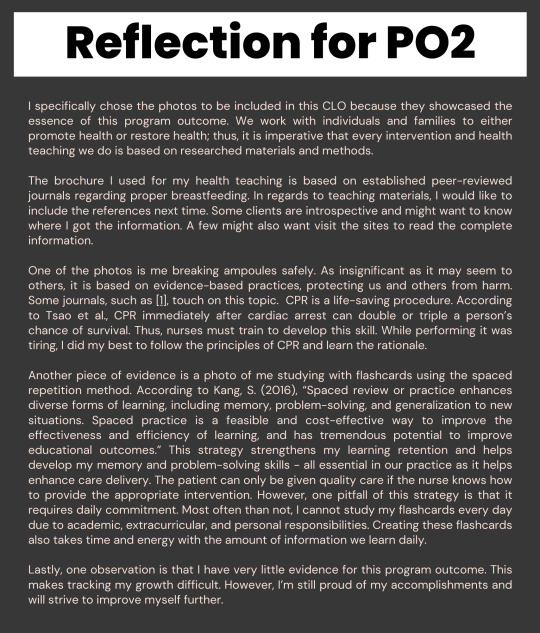
References for this post:
Tsao, C. W., Aday, A. W., Almarzooq, Z. I., Anderson, C. A. M., Arora, P., Avery, C. L., Baker-Smith, C. M., Beaton, A. Z., Boehme, A. K., Buxton, A. E., Commodore-Mensah, Y., Elkind, M. S. V., Evenson, K. R., Eze-Nliam, C., Fugar, S., Generoso, G., Heard, D. G., Hiremath, S., Ho, J. E., … Martin, S. S. (2023). Heart disease and stroke Statistics—2023 update: A report from the American Heart Association. Circulation, 147(8). https://doi.org/10.1161/cir.0000000000001123
Chiannilkulchai, N., & Kejkornkaew, S. (2019, July 1). A comparative study of ampoule breaking and resultant injury among registered nurses Natthacha Chiannilkulchai*, Siranee Kejkornkaew. Docslib. Retrieved April 6, 2023, from https://docslib.org/doc/10778154/a-comparative-study-of-ampoule-breaking-and-resultant-injury-among-registered-nurses-natthacha-chiannilkulchai-siranee-kejkornkaew
Federation of Associations in Behavioral & Brain Sciences. (2016, January 13). Spaced repetition promotes efficient and effective ... - sage journals. Retrieved April 6, 2023, from https://journals.sagepub.com/doi/abs/10.1177/2372732215624708
0 notes
Text
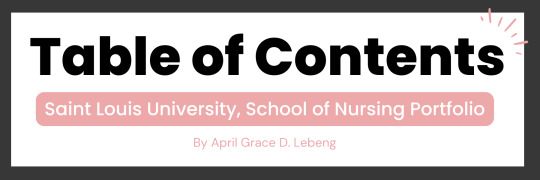
Curriculum Vitae
Purpose of the Portfolio
Personal Statement
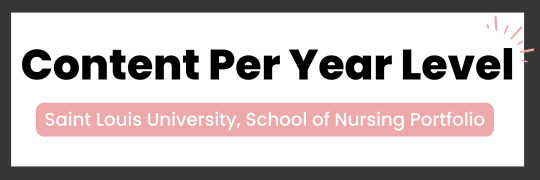
Program Outcomes for 1st Year
Program Outcomes for 2nd Year
Program Outcomes for 3rd Year
Program Outcomes for 4th Year
0 notes
